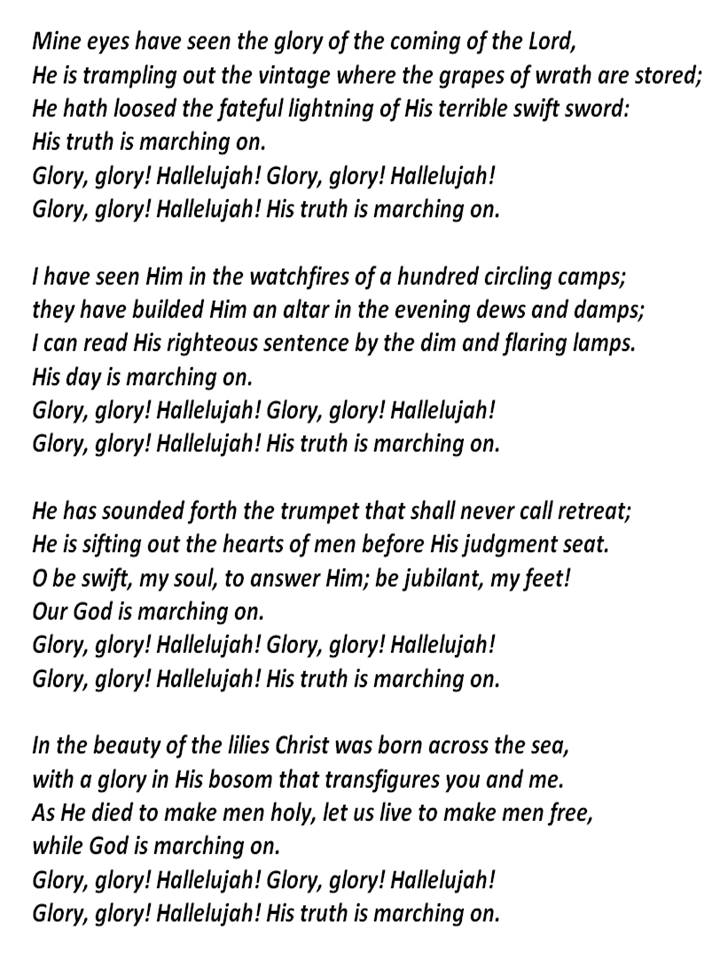Glory Hallelujah is a phrase that resonates deeply within religious communities and popular culture alike. Its origins are steeped in history, and its meaning carries profound significance for millions around the world. Whether you're a theologian, a music enthusiast, or someone curious about cultural symbolism, understanding the essence of "Glory Hallelujah" can enrich your perspective.
From ancient hymns to modern-day anthems, the phrase "Glory Hallelujah" has evolved into a universal expression of praise and triumph. It is often associated with religious contexts, particularly in Christianity, where it represents the celebration of divine glory. However, its influence extends far beyond religious boundaries, making it a cultural phenomenon.
In this article, we will delve into the meaning, history, and cultural impact of "Glory Hallelujah." By exploring its roots, significance, and modern interpretations, we aim to provide a comprehensive understanding of why this phrase continues to inspire and unite people across the globe.
Read also:Puff Diddy Baby Oil Picture A Detailed Exploration Of The Iconic Moment
Table of Contents
- The Meaning of Glory Hallelujah
- Origins and Historical Context
- Religious Significance
- Cultural Impact
- Glory Hallelujah in Music
- Glory Hallelujah in Literature
- Glory Hallelujah in Film and Media
- Modern Usage and Interpretations
- Psychological Effects of Glory Hallelujah
- Conclusion: Embracing the Power of Glory Hallelujah
The Meaning of Glory Hallelujah
The phrase "Glory Hallelujah" is a powerful expression that combines two distinct but complementary ideas. "Glory" refers to the brilliance, majesty, and honor attributed to a divine being, while "Hallelujah" is a Hebrew term meaning "praise the Lord." Together, these words evoke a sense of reverence and celebration.
While the phrase is most commonly associated with Christian worship, its meaning transcends religious boundaries. It symbolizes joy, triumph, and gratitude, making it universally appealing. Understanding the linguistic and cultural roots of "Glory Hallelujah" provides insight into its enduring appeal.
Breaking Down the Components
- Glory: Derived from the Latin word "gloria," it signifies radiance, splendor, and admiration.
- Hallelujah: A Hebrew exclamation used to express praise and worship, often found in Psalms and other religious texts.
Origins and Historical Context
The origins of "Glory Hallelujah" can be traced back to ancient religious texts and practices. Its earliest usage is found in Jewish scriptures, where it was used as a call to worship and celebrate God's greatness. Over time, the phrase was adopted by various religious traditions, particularly Christianity, where it became a central element of liturgical and musical expressions.
Historically, "Glory Hallelujah" gained prominence during the Great Awakening in the 18th century, a period marked by widespread religious revival in the United States. It became a rallying cry for congregations seeking spiritual renewal and unity.
Key Historical Milestones
- 18th Century Revivalism: The phrase was widely used during the Great Awakening.
- 19th Century Civil Rights Movement: "Glory Hallelujah" became a symbol of hope and resilience.
Religious Significance
Within religious contexts, "Glory Hallelujah" holds immense significance. It is used to express devotion, gratitude, and praise to the divine. In Christianity, the phrase is often associated with the celebration of Christ's resurrection and the triumph of good over evil.
Religious leaders and scholars emphasize the transformative power of "Glory Hallelujah." It serves as a reminder of the eternal nature of divine glory and the importance of maintaining a spirit of worship and gratitude.
Read also:Hub4u Movie Download Your Ultimate Guide To Legal And Safe Streaming
Symbolism in Christianity
- Resurrection: Represents the victory of Christ over death.
- Worship: Encourages believers to offer praise and adoration.
Cultural Impact
Beyond its religious roots, "Glory Hallelujah" has made a significant impact on popular culture. It has been featured in music, literature, and film, becoming a symbol of unity and celebration. Its universal appeal lies in its ability to convey emotions of joy, triumph, and hope.
Cultural icons and influencers have embraced the phrase, using it to inspire and motivate audiences. Its presence in various forms of media highlights its versatility and enduring relevance.
Examples in Popular Culture
- Music: Featured in hymns, gospel songs, and contemporary tracks.
- Film: Used as a motif in movies celebrating resilience and faith.
Glory Hallelujah in Music
Music has played a pivotal role in popularizing "Glory Hallelujah." From traditional hymns to modern-day anthems, the phrase has been woven into the fabric of musical expression. Its rhythmic and melodic qualities make it an ideal choice for composers seeking to convey emotions of joy and celebration.
Artists across genres have incorporated "Glory Hallelujah" into their work, creating timeless pieces that resonate with audiences worldwide. Its presence in music underscores its ability to transcend cultural and linguistic barriers.
Famous Songs Featuring Glory Hallelujah
- "Battle Hymn of the Republic": A Civil War-era anthem that uses the phrase to symbolize freedom and justice.
- Modern Gospel Tracks: Contemporary artists continue to innovate with "Glory Hallelujah" in their compositions.
Glory Hallelujah in Literature
Literature provides another avenue for exploring the depth and meaning of "Glory Hallelujah." Authors have used the phrase to convey themes of redemption, triumph, and hope. Its inclusion in novels, poems, and essays adds a layer of richness to the narrative, enhancing the reader's emotional engagement.
Through literature, "Glory Hallelujah" serves as a metaphor for overcoming adversity and finding purpose in life. Its literary significance lies in its ability to inspire and uplift readers, encouraging them to embrace positivity and resilience.
Notable Literary Works
- Classical Texts: Featured in religious and philosophical writings.
- Modern Fiction: Used as a thematic element in contemporary novels.
Glory Hallelujah in Film and Media
Film and media have embraced "Glory Hallelujah" as a powerful narrative tool. Its inclusion in movies, television shows, and documentaries highlights its ability to evoke strong emotional responses. Directors and producers use the phrase to convey themes of triumph, hope, and unity.
Through visual storytelling, "Glory Hallelujah" takes on new dimensions, reaching audiences in ways that words alone cannot achieve. Its presence in film and media ensures its continued relevance in modern culture.
Impact on Visual Storytelling
- Documentaries: Used to explore historical and cultural contexts.
- Movies: Featured in scenes celebrating victory and resilience.
Modern Usage and Interpretations
In contemporary times, "Glory Hallelujah" continues to evolve, adapting to new contexts and interpretations. It is used in social movements, motivational speeches, and even corporate branding, reflecting its universal appeal. Modern interpretations emphasize the phrase's ability to inspire and unite people from diverse backgrounds.
Social media platforms have further amplified the reach of "Glory Hallelujah," allowing it to connect with global audiences. Its presence in digital spaces ensures its continued relevance in an increasingly interconnected world.
Contemporary Applications
- Social Movements: Used as a rallying cry for justice and equality.
- Corporate Branding: Incorporated into marketing campaigns to convey positivity and success.
Psychological Effects of Glory Hallelujah
Research suggests that phrases like "Glory Hallelujah" can have a profound psychological impact on individuals. They evoke positive emotions, enhance mood, and promote a sense of well-being. The repetitive nature of the phrase, combined with its uplifting connotations, makes it an effective tool for emotional regulation and stress relief.
Experts in psychology and neuroscience emphasize the benefits of using affirmations and positive phrases like "Glory Hallelujah" in daily life. They encourage individuals to incorporate such expressions into their routines to foster resilience and optimism.
Benefits for Mental Health
- Emotional Regulation: Helps manage stress and anxiety.
- Resilience Building: Encourages a positive outlook on life.
Conclusion: Embracing the Power of Glory Hallelujah
In conclusion, "Glory Hallelujah" is more than just a phrase; it is a powerful expression of praise, triumph, and hope. Its rich history, cultural significance, and universal appeal make it a timeless symbol of unity and celebration. Whether used in religious contexts, popular culture, or everyday life, "Glory Hallelujah" continues to inspire and uplift people around the world.
We invite you to share your thoughts and experiences with "Glory Hallelujah" in the comments below. Your feedback and insights can enrich our understanding of this powerful phrase. Additionally, explore other articles on our site to deepen your knowledge and appreciation of cultural and spiritual expressions.
Call to Action: Join the conversation and let us know how "Glory Hallelujah" has impacted your life. Together, we can celebrate its enduring legacy and continue to spread its message of hope and unity.

